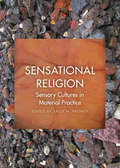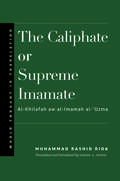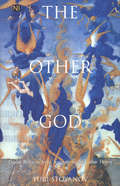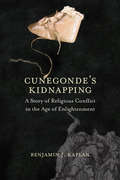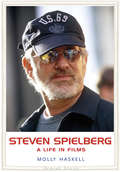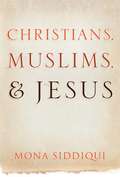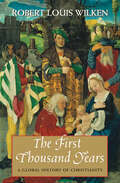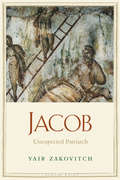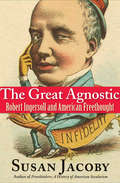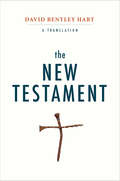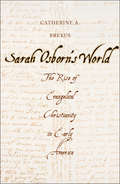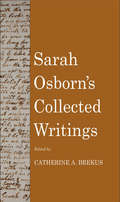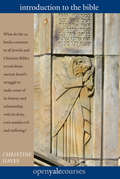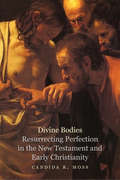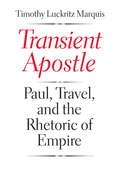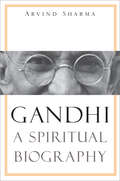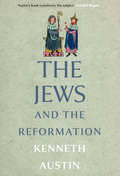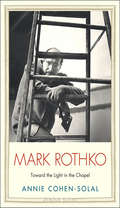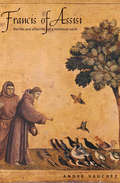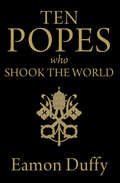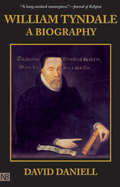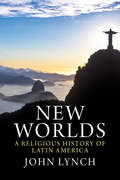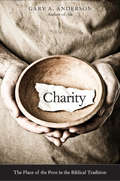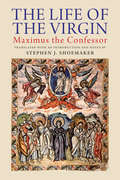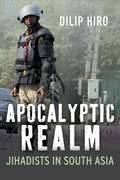- Table View
- List View
Sensational Religion
by Sally PromeyThe result of a collaborative, multiyear project, this groundbreaking book explores the interpretive worlds that inform religious practice and derive from sensory phenomena. Under the rubric of "making sense," the studies assembled here ask, How have people used and valued sensory data? How have they shaped their material and immaterial worlds to encourage or discourage certain kinds or patterns of sensory experience? How have they framed the sensual capacities of images and objects to license a range of behaviors, including iconoclasm, censorship, and accusations of blasphemy or sacrilege? Exposing the dematerialization of religion embedded in secularization theory, editor Sally Promey proposes a fundamental reorientation in understanding the personal, social, political, and cultural work accomplished in religion's sensory and material practice. Sensational Religion refocuses scholarly attention on the robust material entanglements often discounted by modernity's metaphysic and on their inextricable connections to human bodies, behaviors, affects, and beliefs.
The Caliphate or Supreme Imamate (World Thought in Translation)
by Muhammad Rashid RidaA translation of Muhammad Rashid Rida&’s best-known work, which examines the compatibility of Islamic political and legal tradition with modern thought Muhammad Rashid Rida (1865–1935) was a prominent Muslim intellectual and reformer. Born in a village near Tripoli in present-day Lebanon, he was renowned for his founding of Al-Manar, an independent and successful Islamic magazine in which he published The Caliphate or Supreme Imamate as a series beginning in 1922. The work showcased Rida&’s faith in the Islamic tradition as the origin of notions such as self-determination and popular sovereignty, as well as his opposition to Western politics. A realist, he nevertheless argued that a revived Caliphate was viable and held the keys to Muslim empowerment and universal salvation. This skillful translation by Simon A. Wood will make The Caliphate or Supreme Imamate accessible for the first time to English-speaking scholars and students of political theory and the modern Middle East.
The Other God
by Mr Yuri StoyanovThis fascinating book explores the evolution of religious dualism, the doctrine that man and cosmos are constant battlegrounds between forces of good and evil. It traces this evolution from late Egyptian religion and the revelations of Zoroaster and the Orphics in antiquity through the Dead Sea Scrolls, the Mithraic Mysteries, and the great Gnostic teachers to its revival in medieval Europe with the suppression of the Bogomils and the Cathars, heirs to the age-long teachings of dualism. Integrating political, cultural, and religious history, Yuri Stoyanov illuminates the dualist religious systems, recreating in vivid detail the diverse worlds of their striking ideas and beliefs, their convoluted mythologies and symbolism. Reviews of an earlier edition:"A book of prime importance for anyone interested in the history of religious dualism. The author's knowledge of relevant original sources is remarkable; and he has distilled them into a convincing and very readable whole."--Sir Steven Runciman"The most fascinating historical detective story since Steven Runciman's Sicilian Vespers."--Colin Wilson"A splendid account of the decline of the dualist tradition in the East . . . both strong and accessible. . . . The most readable account of Balkan heresy ever."--Jeffrey B. Russell, Journal of Religion "Well-written, fact-filled, and fascinating . . . has in it the making of a classic."--Harry T. Norris, Bulletin of SOAS
Cunegonde's Kidnapping
by Benjamin J. KaplanIn a remote village on the Dutch-German border, a young Catholic woman named Cunegonde tries to kidnap a baby to prevent it from being baptized in a Protestant church. When she is arrested, fellow Catholics stage an armed raid to free her from detention. These dramatic events of 1762 triggered a cycle of violence, starting a kind of religious war in the village and its surrounding region. Contradicting our current understanding, this war erupted at the height of the Age of Enlightenment, famous for its religious toleration. Cunegonde’s Kidnapping tells in vivid detail the story of this hitherto unknown conflict. Drawing characters, scenes, and dialogue straight from a body of exceptional primary sources, it is the first microhistorical study of religious conflict and toleration in early modern Europe. In it, Benjamin J. Kaplan explores the dilemmas of interfaith marriage and the special character of religious life in a borderland, where religious dissenters enjoy unique freedoms. He also challenges assumptions about the impact of Enlightenment thought and suggests that, on a popular level, some parts of eighteenth-century Europe may not have witnessed a #147;rise of toleration. ”
Steven Spielberg: A Life in Films
by Molly HaskellA film-centric portrait of the extraordinarily gifted movie director whose decades-long influence on American popular culture is unprecedented “Everything about me is in my films,” Steven Spielberg has said. Taking this as a key to understanding the hugely successful moviemaker, Molly Haskell explores the full range of Spielberg’s works for the light they shine upon the man himself. Through such powerhouse hits as Close Encounters of the Third Kind, E.T., Jurassic Park, and Indiana Jones, to lesser-known masterworks like A.I. and Empire of the Sun, to the haunting Schindler’s List, Haskell shows how Spielberg’s uniquely evocative filmmaking and story-telling reveal the many ways in which his life, work, and times are entwined. Organizing chapters around specific films, the distinguished critic discusses how Spielberg’s childhood in non-Jewish suburbs, his parents’ traumatic divorce, his return to Judaism upon his son’s birth, and other events echo in his work. She offers a brilliant portrait of the extraordinary director—a fearful boy living through his imagination who grew into a man whose openness, generosity of spirit, and creativity have enchanted audiences for more than 40 years.
Christians, Muslims and Jesus
by Mona SiddiquiProphet or messiah, the figure of Jesus serves as both the bridge and the barrier between Christianity and Islam. In this accessible and revelatory book, Muslim scholar and popular commentator Mona Siddiqui explores the theological links between the two religions, showing how Islamic thought has approached and responded to Jesus and Christological themes from its earliest days to modern times. The author finds that the philosophical overlap between the two religions is greater than previously imagined, and this being so, her book brings with it the hope of improving interfaith communication and understanding. Through a careful analysis of selected works by major Christian and Muslim theologians during the formative, medieval, and modern periods of both religions, Siddiqui focuses on themes including revelation, prophesy, salvation, redemption, grace, sin, eschatology, law, and love. How did some become the defining characteristics of one faith and not the other? Which--and why--do some translate between the two religions? With a nuanced and carefully considered analysis of critical doctrines of Christianity and Islam, the author provides a refreshing counterpoint to contemporary polemical arguments and makes an important contribution to reasoned interfaith conversation.
The First Thousand Years: A Global History of Christianity
by Robert WilkenHow did a community that was largely invisible in the first two centuries of its existence go on to remake the civilizations it inhabited, culturally, politically, and intellectually? Beginning with the life of Jesus, Robert Louis Wilken narrates the dramatic spread and development of Christianity over the first thousand years of its history. Moving through the formation of early institutions, practices, and beliefs to the transformations of the Roman world after the conversion of Constantine, he sheds new light on the subsequent stories of Christianity in the Latin West, the Byzantine and Slavic East, the Middle East, and Central Asia.Through a selected narration of particularly noteworthy persons and events, Wilken demonstrates how the coming of Christianity set in motion one of the most profound revolutions the world has known. This is not a story limited to the West; rather, Christian communities in Ethiopia, Nubia, Armenia, Georgia, Persia, Central Asia, India,
Jacob
by Yair ZakovitchA powerful hero of the Bible, Jacob is also one of its most complex figures. Bible stories recounting his life often expose his deception, lies, and greed--then, puzzlingly, attempt to justify them. In this book, eminent biblical scholar Yair Zakovitch presents a complete view of the patriarch, first examining Jacob and his life story as presented in the Bible, then also reconstructing the stories that the Bible writers suppressed--tales that were well-known, perhaps, but incompatible with the image of Jacob they wanted to promote. Through a work of extraordinary "literary archaeology," Zakovitch explores the recesses of literary history, reaching back even to the stage of oral storytelling, to identify sources of Jacob's story that preceded the work of the Genesis writers. The biblical writers were skilled mosaic-makers, Zakovitch shows, and their achievement was to reshape diverse pre-biblical representations of Jacob in support of their emerging new religion and identity. As the author follows Jacob in his wanderings and revelations, his successes, disgraces, and disappointments, he also considers the religious and political environment in which the Bible was written, offering a powerful explication of early Judaism.
The Great Agnostic: Robert Ingersoll and American Freethought
by Susan Jacoby&“Jacoby writes with wit and vigor, affectionately resurrecting a man whose life and work are due for reconsideration&” (The Boston Globe). During the Gilded Age, which saw the dawn of America&’s enduring culture wars, Robert Green Ingersoll was known as &“the Great Agnostic.&” The nation&’s most famous orator, he raised his voice on behalf of Enlightenment reason, secularism, and the separation of church and state with a power unmatched since America&’s revolutionary generation. When he died in 1899, even his religious enemies acknowledged that he might have aspired to the US presidency had he been willing to mask his opposition to religion. To the question that retains its controversial power today—was the United States founded as a Christian nation?—Ingersoll answered an emphatic no. In this provocative biography, Susan Jacoby, author of Freethinkers: A History of American Secularism, restores Ingersoll to his rightful place in an American intellectual tradition extending from Thomas Jefferson and Thomas Paine to the current generation of &“new atheists.&” Jacoby illuminates the ways in which America&’s often-denigrated and forgotten secular history encompasses issues, ranging from women&’s rights to evolution, as potent and divisive today as they were in Ingersoll&’s time. Ingersoll emerges in this portrait as an indispensable public figure who devoted his life to that greatest secular idea of all—liberty of conscience belonging to the religious and nonreligious alike. &“Jacoby&’s goal of elucidating the life and work of Robert Ingersoll is admirably accomplished. She offers a host of well-chosen quotations from his work, and she deftly displays the effect he had on others. For instance: after a young Eugene V. Debs heard Ingersoll talk, Debs accompanied him to the train station and then—just so he could continue the conversation—bought himself a ticket and rode all the way from Terre Haute to Cincinnati. Readers today may well find Ingersoll&’s company equally entrancing.&” —Jennifer Michael Hecht, The New York Times Book Review
The New Testament: A Translation
by David Bentley HartFrom one of our most celebrated writers on religion comes this fresh, bold, and unsettling new translation of the New Testament David Bentley Hart undertook this new translation of the New Testament in the spirit of "etsi doctrina non daretur," "as if doctrine is not given. " Reproducing the texts' often fragmentary formulations without augmentation or correction, he has produced a pitilessly literal translation, one that captures the texts' impenetrability and unfinished quality while awakening readers to an uncanniness that often lies hidden beneath doctrinal layers. The early Christians' sometimes raw, astonished, and halting prose challenges the idea that the New Testament affirms the kind of people we are. Hart reminds us that they were a company of extremists, radical in their rejection of the values and priorities of society not only at its most degenerate, but often at its most reasonable and decent. "To live as the New Testament language requires," he writes, "Christians would have to become strangers and sojourners on the earth, to have here no enduring city, to belong to a Kingdom truly not of this world. And we surely cannot do that, can we?"
Sarah Osborn's World
by Catherine A. BrekusIn 1743, sitting quietly with pen in hand, Sarah Osborn pondered how to tell the story of her life, how to make sense of both her spiritual awakening and the sudden destitution of her family. Remarkably, the memoir she created that year survives today, as do more than two thousand additional pages she composed over the following three decades. Sarah Osborn's World is the first book to mine this remarkable woman's prolific personal and spiritual record. Catherine Brekus recovers the largely forgotten story of Sarah Osborn's life as one of the most charismatic female religious leaders of her time, while also connecting her captivating story to the rising evangelical movement in eighteenth-century America.A schoolteacher in Rhode Island, a wife, and a mother, Sarah Osborn led a remarkable revival in the 1760s that brought hundreds of people, including many slaves, to her house each week. Her extensive written record--encompassing issues ranging from the desire to be "born again" to a suspicion of capitalism--provides a unique vantage point from which to view the emergence of evangelicalism. Brekus sets Sarah Osborn's experience in the context of her revivalist era and expands our understanding of the birth of the evangelical movement--a movement that transformed Protestantism in the decades before the American Revolution.
Sarah Osborn’s Collected Writings
by Catherine A. Brekus Sarah OsbornRiveting and eloquent, the collected writings of a key figure—and one of the first female leaders—of the eighteenth-century evangelical movement Sarah Osborn (1714–1796) was one of the most charismatic female religious leaders of her time and one of relatively few colonial women whose writings have been preserved. This volume reprints selections from Osborn’s fascinating manuscripts, including her memoir, letters, and diaries. An evangelical Christian who led popular revival meetings at her own home, Osborn was also a gifted writer who recorded the story of her life. In thousands of pages of manuscripts, Osborn chronicled her personal struggles alongside the great events of her age, including the Great Awakening, the French and Indian War, the moral crisis posed by slavery, and the American Revolution. A rare opportunity to hear an early American woman speak about her faith and her religious leadership, this masterfully edited work is also an invaluable resource for understanding the rise of evangelical Christianity.
Introduction to the Bible
by Christine HayesThis book examines the small library of 24 books common to all Jewish and Christian Bibles—books that preserve the efforts of diverse writers over a span of many centuries to make sense of their personal experiences and those of their people, the ancient Israelites. Professor Christine Hayes guides her readers through the complexities of this polyphonous literature that has served as a foundational pillar of Western civilization, underscoring the variety and even disparities among the voices that speak in the biblical texts. Biblical authors wrote in many contexts and responded to a sweeping range of crises and questions concerning issues that were political, economic, historical, cultural, philosophical, religious, and moral. In probing chapters devoted to each of the 24 books of the Hebrew Bible, or Old Testament, Hayes reconstructs the meanings and messages of each book and encourages a deeper appreciation of the historical and cultural settings of ancient biblical literature.
Divine Bodies: Resurrecting Perfection in the New Testament and Early Christianity
by Candida R. MossA path‑breaking scholar’s insightful reexamination of the resurrection of the body and the construction of the self When people talk about the resurrection they often assume that the bodies in the afterlife will be perfect. But which version of our bodies gets resurrected—young or old, healthy or sick, real-to-life or idealized? What bodily qualities must be recast in heaven for a body to qualify as both ours and heavenly? The resurrection is one of the foundational statements of Christian theology, but when it comes to the New Testament only a handful of passages helps us answer the question “What will those bodies be like?” More problematically, the selection and interpretation of these texts are grounded in assumptions about the kinds of earthly bodies that are most desirable. Drawing upon previously unexplored evidence in ancient medicine, philosophy, and culture, this illuminating book both revisits central texts—such as the resurrection of Jesus—and mines virtually ignored passages in the Gospels to show how the resurrection of the body addresses larger questions about identity and the self.
Transient Apostle
by Timothy Luckritz MarquisIn a significant reevaluation of Paulâ TMs place in the early Christian story, Timothy Luckritz Marquis explores the theme of travel in the apostleâ TMs correspondence. He casts Paulâ TMs rhetorical strategies against the background of Augustusâ TMs age, when Romeâ TMs wealth depended on conquests abroad, the international commerce they facilitated, and the incursion of foreign customs and peoples they brought about. In so doing, Luckritz Marquis provides an explanation for how Paul created, maintained, and expanded his local communities in the larger, international Jesus movement and shows how Paul was a product of the material forces of his day.â œThis is the single most sophisticated book on Paul to be written within the paradigms of contemporary critical thought. By integrating its extensive, erudite, and compelling citations of the Greco-Roman world in which Paul was writing with post-colonial and post-Marxist thinking, it makes real progress in understanding Paulâ TMs letters.â ?â "Daniel Boyarin
Gandhi: A Spiritual Biography
by Arvind SharmaIn his Autobiography, Gandhi wrote, "What I want to achieve--what I have been striving and pining to achieve these thirty years--is self-realization, to see God face to face. . . . All that I do by way of speaking and writing, and all my ventures in the political field, are directed to this same end." While hundreds of biographies and histories have been written about Gandhi (1869-1948), nearly all of them have focused on the political, social, or familial dimensions of his life. Very few, in recounting how Gandhi led his country to political freedom, have viewed his struggle primarily as a search for spiritual liberation.Shifting the focus to the understudied subject of Gandhi's spiritual life, Arvind Sharma retells the story of Gandhi's life through this lens. Illuminating unsuspected dimensions of Gandhi's inner world and uncovering their surprising connections with his outward actions, Sharma explores the eclectic religious atmosphere in which Gandhi was raised, his belief in reincarnation, his conviction that morality and religion are synonymous, his attitudes toward tyranny and freedom, and, perhaps most important, the mysterious source of his power to establish new norms of human conduct. This book enlarges our understanding of one of history's most profoundly influential figures, a man whose trust in the power of the soul helped liberate millions.
The Jews and the Reformation
by Kenneth AustinJudaism has always been of great significance to Christianity but this relationship has also been marked by complexity and ambivalence. The emergence of new Protestant confessions in the Reformation had significant consequences for how Jews were viewed and treated. In this wide-ranging account, Kenneth Austin examines Christian attitudes toward Jews, the Hebrew language, and Jewish learning, arguing that they have much to tell us about the Reformation and its priorities—and have important implications for how we think about religious pluralism today.
Mark Rothko
by Annie Cohen-SolalMark Rothko, one of the greatest painters of the twentieth century, was born in the Jewish Pale of Settlement in 1903. He immigrated to the United States at age ten, taking with him his Talmudic education and his memories of pogroms and persecutions in Russia. His integration into American society began with a series of painful experiences, especially as a student at Yale, where he felt marginalized for his origins and ultimately left the school. The decision to become an artist led him to a new phase in his life. Early in his career, Annie Cohen-Solal writes, "he became a major player in the social struggle of American artists, and his own metamorphosis benefited from the unique transformation of the U.S. art world during this time." Within a few decades, he had forged his definitive artistic signature, and most critics hailed him as a pioneer. The numerous museum shows that followed in major U.S. and European institutions ensured his celebrity. But this was not enough for Rothko, who continued to innovate. Ever faithful to his habit of confronting the establishment, he devoted the last decade of his life to cultivating his new conception of art as an experience, thanks to the commission of a radical project, the Rothko Chapel in Houston, Texas. Cohen-Solal's fascinating biography, based on considerable archival research, tells the unlikely story of how a young immigrant from Dvinsk became a crucial transforming agent of the art world--one whose legacy prevails to this day.
Francis of Assisi: The Life and Afterlife of a Medieval Saint (Medieval Lives Ser.)
by Andre VauchezA biography of the saint as both mystic and man: &“The single best book about Francis now available in English&” (Commonweal). In this towering work, Andre Vauchez draws on the vast body of scholarship on Francis of Assisi, particularly the important research of recent decades, to create a complete and engaging portrait of the saint. He also explores how the memory of Francis was shaped by contemporaries who recollected him in their writings, and completes the book by setting &“il Poverello&” in the context of his time, bringing to light what was new, surprising, and even astonishing in the life and vision of this man. The first part of the book is a fascinating reconstruction of Francis&’s life and work. The second and third parts deal with the texts—hagiographies, chronicles, sermons, personal testimonies, etc.—of writers who recorded aspects of Francis&’s life and movement as they remembered them, and used those remembrances to construct a portrait of Francis relevant to their concerns. Finally, Vauchez explores those aspects of Francis&’s life, personality, and spiritual vision that were unique to him, including his experience of God, his approach to nature, his understanding and use of Scripture, and his impact on culture as well as culture&’s impact on him. &“Considered one of the great spiritual leaders of humankind, Francis of Assisi was also a man of many faces and personas: ascetic, the founder of a religious order, a romantic hero, a mystic, a defender of the poor, a promoter of peace. But as Vauchez emphasizes—and this biography constantly reminds us—Francis was also a flesh-and-blood human being . . . A bracing, erudite account of a mystic&’s life.&” —Booklist
Ten Popes Who Shook the World
by Eamon Duffy&“Simply brilliant&” essays on the leaders who have most powerfully shaped not just the Church itself, but the course of human history (Catholic Library World). The Bishops of Rome have been Christianity&’s most powerful leaders for nearly two millennia, and their influence has extended far beyond the purely spiritual. The popes have played a central role in the history of Europe and the wider world, not only shouldering the spiritual burdens of their ancient office, but also contending with—and sometimes precipitating—the cultural and political crises of their times. In an acclaimed series of BBC radio broadcasts, Eamon Duffy explored the impact of ten popes he judged to be among the most influential in history. With this &“enlightening&” book (Booklist), readers may now also enjoy Duffy&’s portraits of these ten exceptional men who shook the world. Beginning with St. Peter, the Rock upon whom the Catholic Church was built, he follows with Leo the Great (fifth century), Gregory the Great (sixth century), Gregory VII (eleventh century), Innocent III (thirteenth century), Paul III (sixteenth century), and Pius IX (nineteenth century). Among twentieth-century popes, Duffy examines the lives and contributions of Pius XII, who was elected on the eve of the Second World War, the kindly John XXIII, who captured the world&’s imagination, and John Paul II, the first non-Italian pope in 450 years. Each of these ten extraordinary individuals, Duffy shows, shaped their own worlds—and in the process, helped to create ours. &“The author is an accomplished writer who is able to make history read like a dramatic novel…Those looking for a concise and even entertaining primer to the papacy will find this collection, if not infallible, at least very worthwhile.&”—Publishers Weekly
William Tyndale
by David DaniellWilliam Tyndale (1494-1536) was the first person to translate the Bible into English from its original Greek and Hebrew and the first to print the Bible in English, which he did in exile. Giving the laity access to the word of God outraged the clerical establishment in England: he was condemned, hunted, and eventually murdered. However, his masterly translation formed the basis of all English bibles--including the "King James Bible," many of whose finest passages were taken unchanged, though unacknowledged, from Tyndale's work.This important book, published in the quincentenary year of his birth, is the first major biography of Tyndale in sixty years. It sets the story of his life in the intellectual and literary contexts of his immense achievement and explores his influence on the theology, literature, and humanism of Renaissance and Reformation Europe.David Daniell, editor of Tyndale's New Testament and Tyndale's Old Testament, eloquently describes the dramatic turns in Tyndale's life. Born in England and educated at Oxford, Tyndale was ordained as a priest. When he decided to translate the Bible into English, he realized that it was impossible to do that work in England and moved to Germany, living in exile there and in the Low Countries while he translated and printed first the New Testament and then half of the Old Testament. These were widely circulated-and denounced-in England. Yet Tyndale continued to write from abroad, publishing polemics in defense of the principles of the English reformation. He was seized in Antwerp, imprisoned in Vilvoorde Castle near Brussels, and burnt at the stake for heresy in 1536.Daniell discusses Tyndale's achievement as biblical translator and expositor, analyzes his writing, examines his stylistic influence on writers from Shakespeare to those of the twentieth century, and explores the reasons why he has not been more highly regarded. His book brings to life one of the great geniuses of the age.
New Worlds a Religious History of Latin America
by John LynchThis extraordinary book encompasses the time period from the first Christian evangelists' arrival in Latin America to the dictators of the late twentieth century. With unsurpassed knowledge of Latin American history, John Lynch sets out to explore the reception of Christianity by native peoples and how it influenced their social and religious lives as the centuries passed. As attentive to modern times as to the colonial period, Lynch also explores the extent to which Indian religion and ancestral ways survived within the new Christian culture. The book follows the development of religious culture over time by focusing on peak periods of change: the response of religion to the Enlightenment, the emergence of the Church from the wars of independence, the Romanization of Latin American religion as the papacy overtook the Spanish crown in effective control of the Church, the growing challenge of liberalism and the secular state, and in the twentieth century, military dictators' assaults on human rights. Throughout the narrative, Lynch develops a number of special themes and topics. Among these are the Spanish struggle for justice for Indians, the Church's position on slavery, the concept of popular religion as distinct from official religion, and the development of liberation theology.
Charity
by Gary A. AndersonIt has long been acknowledged that Jews and Christians distinguished themselves through charity to the poor. Though ancient Greeks and Romans were also generous, they funded theaters and baths rather than poorhouses and orphanages. How might we explain this difference? In this significant reappraisal of charity in the biblical tradition, Gary Anderson argues that the poor constituted the privileged place where Jews and Christians met God. Though concerns for social justice were not unknown to early Jews and Christians, the poor achieved the importance they did primarily because they were thought to be "living altars," a place to make a sacrifice, a loan to God that he, as the ultimate guarantor, could be trusted to repay in turn. Contrary to the assertions of Reformation and modern critiques, belief in a heavenly treasury was not just about self-interest. Sifting through biblical and postbiblical texts, Anderson shows how charity affirms the goodness of the created order; the world was created through charity and therefore rewards it.
The Life of the Virgin
by Stephen J. ShoemakerLong overlooked by scholars, this seventh-centuryLife of the Virgin, attributed to Maximus the Confessor, is the earliest complete Marian biography. Originally written in Greek and now surviving only in Old Georgian, it is now translated for the first time into English. It is a work that holds profound significance for understanding the history of late ancient and medieval Christianity, providing a rich source for understanding the history of Christian piety. ThisLifeis especially remarkable for its representation of Mary's prominent involvement in her son's ministry and her leadership of the early Christian community. In particular, it reveals highly developed devotion to Mary's compassionate suffering at the Crucifixion, anticipating by several centuries an influential medieval style of devotion known as “affective piety” whose origins generally have been confined to the Western High Middle Ages.
Apocalyptic Realm
by Dilip HiroThis hard-hitting and timely book explores the roots of militant Islam in South Asia and how it has grown to become a source of profound global alarm. By meticulously tracking the rise of the jihadist movement from its initial violence in Afghanistan in 1980 to the present day, Dilip Hiro challenges conventional narratives of the roles of Afghanistan, Pakistan, the Soviet Union, the United States, and India. He warns that the Line of Control in Kashmir, where jihadists seek to incite war between nuclear-armed Pakistan and India, is today the most dangerous border in the world. Drawing on evidence from a wide variety of sources including newly released Kremlin archives and classified U. S. Embassy documents published by WikiLeaks, the author compiles the first complete and accurate history of Islamist terrorism in South Asia. He chronicles historic links between Pakistan, Afghanistan, and India and their varying degrees of destabilization at the hands of the jihadists. He also sheds unprecedented light on the close military and intelligence links that have developed between India and Israel. Finally, he outlines the ambitions of Pakistani, Afghan, and Al Qaeda jihadists to establish an "apocalyptic realm" covering South, Central, and Western Asia. Compact, comprehensive, and fast paced, this book lays bare the causes of today's escalating terrorist threat, sets the historical record straight, and offers fresh strategies for defeating jihadist extremism.
